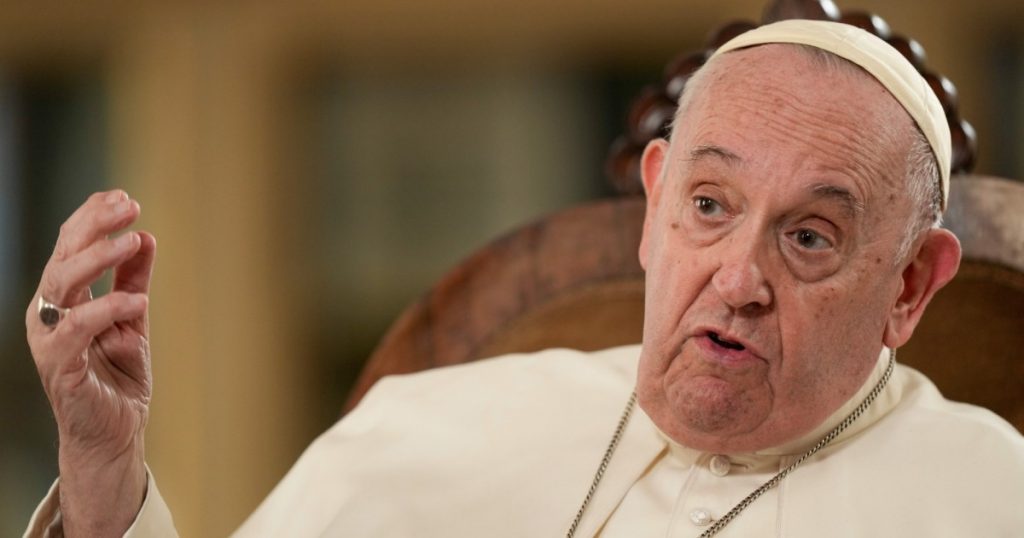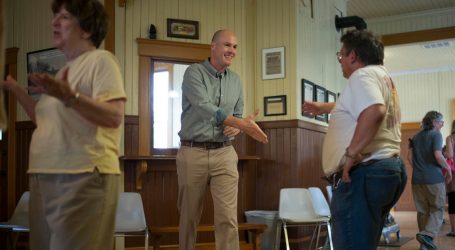Being Gay Shouldn’t Be a Crime, Pope Says
Andrew Medichini/AP
Fight disinformation: Sign up for the free Mother Jones Daily newsletter and follow the news that matters.In an interview with the Associated Press, Pope Francis has become the first Roman Catholic pontiff to denounce laws that criminalize homosexuality.
“Being homosexual isn’t a crime,” the 86-year-old pontiff told the AP on Tuesday. Laws that criminalize homosexuality, Francis said, are “unjust,” and the Catholic Church “must” seek to end them.
Let’s not get too excited. Church teaching on homosexuality isn’t about to change; Pope Francis has repeatedly reaffirmed the Catholic teaching that homosexual acts are “sins.” But he also reasserted another position he has taken throughout his papacy: that we are, more importantly, “all children of God.” It’s certainly a sharp contrast to LGBTQ panics like the “groomer” narrative spun by many Republican politicians—including some who claim to be Catholics.
While an AP interview with is hardly a seal of papal infallibility, and clearly the Pope doesn’t write laws, this is a big deal when it comes to fighting for a safer world for LGBTQ people. AP reports that 67 countries or jurisdictions criminalize consensual same-sex activity. Eleven of those can and do enforce the death penalty for it. Notably, the interview comes just before the pontiff’s visit to South Sudan, whose population is nearly 40 percent Roman Catholic, and where LGBTQ people are aggressively prosecuted.
15 US states have anti-sodomy laws on the books, according to the ACLU, despite a 2003 Supreme Court ruling making them null and void. Activists say those laws make LGBT people more vulnerable to harassment and discrimination. Anti-LGBT legislation has been skyrocketing around the country and with the privacy laws once protected by Roe overturned, there are concerns that anti-sodomy laws could be next.
The United Nations has called for an end to laws that criminalize homosexuality, including a declaration in 2008 that went too far for the Vatican administration of Francis’s predecessor, Pope Benedict XVI. Perhaps we’ll see the Vatican more active in future UN efforts around LGBTQ rights, an area where the Holy See does have power.
As Father James Martin, a Jesuit priest who works with LGBTQ communities, wrote on his blog, Outreach:
In the recent past, several Catholic bishops, and at least one bishops’ conference, have publicly supported such repressive laws. In Ghana, the Catholic bishops conference recently said, “homosexual practices [should be made] illegal in Ghana.” Other Catholic bishops, while not calling for imprisonment, have made disparaging remarks against LGBTQ people: for example, a bishop in Poland who called homosexuality a “plague.” Such statements serve to increase hatred of LGBTQ people and contribute to a culture of bullying, harassment and violence. Overall, though, despite pleas from LGBTQ people suffering persecution, few bishops or bishops’ conferences have condemned the criminalizing laws that the pope rejected today, even though this is, after all, a life issue.
In his interview, Francis acknowledged those views and said that bishops who hold them “have to have a process of conversion.” The nation’s youngest cardinal, Bishop Robert McElroy, published a column the same day that advocates the “radical inclusion” of marginalized Catholics, including LGBTQ people—earning the rage of several prominent conservative Catholics.
If, under Francis’ leadership, the whole church is called to oppose laws criminalizing homosexuality, that applies to people like Catholic Florida Gov. Ron DeSantis—whose recently signed “Don’t Say Gay” law forbids all teaching on sexual orientation or gender identity where “developmentally inappropriate,” including to all children younger than third grade. That’s certainly not on par with death by stoning, but still marginalizes and harms LGBT people. It also flies in the face of the current pope and the Catholic catechism, which forbids “unjust discrimination” against gay and lesbian people (the catechism does not recognize transgender people).
Self-styled traditional Catholics often make opposition to LGBTQ rights and dignity a lynchpin of “countercultural” Catholic identity. The pope and a growing number of pastoral bishops he has appointed remind us that Jesus does not measure faithfulness in who you exclude.
— John Gehring (@gehringdc) January 25, 2023




